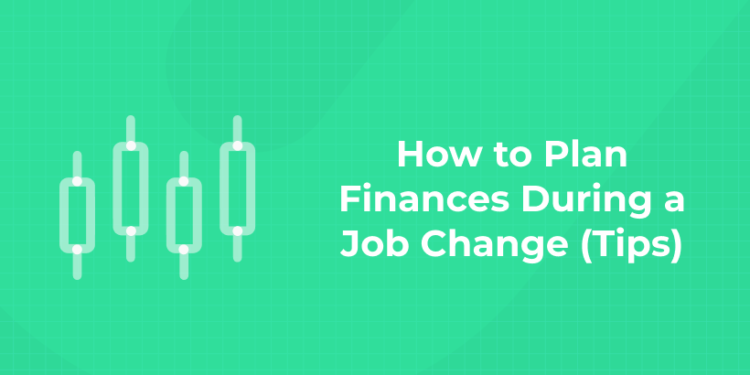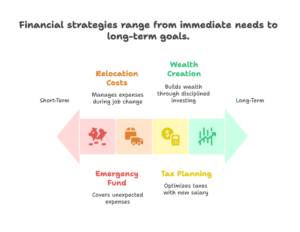Table of Contents
Introduction
Changing jobs is a big move in India’s busy job market. A better salary or new role can feel exciting, but it shakes up finances. Without a plan, savings might shrink, or debts could grow. In 2024, hiring in IT, banking, and retail jumped 15% (TeamLease Report). Many professionals, though, miss planning their money during this shift. Gaps between paychecks, new salary setups, or changing benefits can stress budgets. This guide shares simple steps to stay financially secure. It covers checking current finances, handling income gaps, and setting new goals. Written for Indian workers, especially those dabbling in stocks, this article along with Entri’s stock market course makes money management clear for a smooth job switch. Read on for practical tips to keep finances steady.
Learn Stock Marketing with a Share Trading Expert! Explore Here!
Understand Your Financial Standing
1: What is a stock?
Before switching jobs, map out current finances. Think of it like checking fuel before a long drive. List income sources: salary, stock dividends, or freelance gigs. Write down expenses: rent, EMIs, groceries, or chai runs. Subtract debts (credit cards, bike loans) from assets (savings, mutual funds, gold). For example, ₹6 lakh in a fixed deposit minus a ₹1.5 lakh loan equals ₹4.5 lakh net worth.
Check three months of bank statements. Notice spending habits. Overspending on Swiggy orders? Saving too little? Stock market fans should review portfolios. Are investments spread across banks, IT, or pharma stocks? Holding only one stock, like ₹3 lakh in a single company, risks heavy losses if it tanks. Mutual fund SIPs need a look too. A mix of 50% equity, 40% debt, and 10% gold keeps things stable. Apps like Moneycontrol show portfolio health. In cities like Chennai, financial advisors charge ₹3,000 for a session. Clear numbers help plan a stress-free job change.
Plan for Income Gaps
New jobs often delay paychecks. Some companies take a month to process salaries. Others start with lower pay during probation. Save enough for 3–6 months of expenses to stay safe. For a ₹45,000 monthly budget, target ₹1.35–2.7 lakh in an emergency fund. Keep it in a savings account or liquid fund, not stocks. Liquid funds, like SBI Liquid Fund, give 6–7% returns and quick access.
Living costs hit hard in Indian cities. A 1BHK in Delhi rents for ₹25,000–40,000. Add food, transport, and Wi-Fi, and expenses climb. Moving for a job? Packers and movers cost ₹10,000–15,000. Don’t sell stocks in a market dip to cover costs. Losing 15% on a ₹2 lakh portfolio means ₹30,000 gone. Instead, pause Netflix (₹500/month) or cut Zomato orders (₹2,000/month). Gig workers, like Uber drivers or Upwork freelancers, face longer gaps. Save for 6–9 months. Apps like Paytm track daily spending to keep budgets tight.
Manage Employee Benefits and Deductions
Job switches change benefits like PF, gratuity, or stock options. India’s PF system builds retirement savings. Transfer PF to the new employer via the EPFO portal using UAN. It’s quick and free. Cashing out PF early triggers taxes. Withdrawing ₹4 lakh after three years could mean a ₹40,000 tax bill at 10%. Check current job perks. Encashing unused leaves might add ₹25,000–60,000. New employers may offer meal vouchers or cab allowances, boosting take-home pay by ₹3,000–6,000 monthly.
Stock options (ESOPs) need attention for market-savvy workers. Unvested ESOPs can’t be sold, so check terms. Selling early might lose future gains. For example, ₹1 lakh in ESOPs could double in three years. Ask HR about new perks. A Gurugram IT firm might give ₹5,000 monthly for transport. Compare old and new benefits to adjust spending. Tax experts in Mumbai charge ₹4,000 for advice on ESOPs or PF. Clear benefit details prevent budget surprises.
Rethink Your Insurance Needs
A job change can mess with insurance. Many Indian firms provide group health plans. Check the new policy. Does it cover parents or kids? A ₹5–10 lakh cover suits most families. If the plan’s weak, get a personal policy. A ₹10 lakh family floater from Star Health costs ₹18,000 yearly. Life insurance matters too. A term plan worth 12 times annual income is smart. For a ₹10 lakh salary, aim for ₹1.2 crore coverage. Premiums start at ₹12,000/year for a 35-year-old.
Don’t depend only on company plans. They stop when the job ends. Stock investors should protect portfolios too. A market crash could cut a ₹6 lakh investment by 20%. Balance it with debt funds or PPF. Compare policies on Policybazaar. In smaller cities like Jaipur, agents offer free quotes. Solid insurance keeps families safe during job shifts.
Stock Market Training Reviewed & Monitored by SEBI Registered RA
Trusted, concepts to help you grow with confidence. Enroll now and learn to start investing the right way.
Know moreRework Your Budget for the Transition Period
A new job calls for a fresh budget. List fixed costs: rent, loan EMIs, kids’ school fees. A 2BHK in Hyderabad runs ₹20,000–35,000 monthly. Variable costs include groceries (₹6,000), fuel (₹4,000), and electricity (₹2,500). Relocating? Budget ₹12,000 for movers and ₹50,000 for a rental deposit in cities like Pune. Cut extras like cafe visits (₹1,500/month) or Amazon Prime (₹1,499/year).
Stock market investors should avoid big trades now. A Nifty drop of 10% could hit a ₹3 lakh portfolio hard. Stick to safe bets like FDs (6% returns) or debt funds. Budgeting apps like Monefy help track daily spends. Moving to a pricier city like Mumbai? Expect ₹55,000 monthly for a single person. Plan for three months to settle in. Save any joining bonus (₹50,000–1 lakh) for emergencies. Tight budgets keep finances steady.
Understand New Salary Structure and Deductions
Indian salaries mix basic pay, HRA, and allowances. CTC looks big, but deductions like PF (12%) and taxes (10–20%) cut take-home pay. A ₹12 lakh CTC might leave ₹65,000 monthly. Ask HR for a salary breakdown. HRA helps in high-rent cities. Paying ₹25,000 rent in Bengaluru? Claim HRA to save taxes. Allowances like LTA or phone reimbursements add ₹2,000–4,000 monthly.
Higher pay means room for bigger stock investments. A ₹12,000 monthly SIP in a large-cap fund (12% returns) can grow to ₹60 lakh in 15 years. Lower CTC? Focus on essentials. Skip big buys like a ₹15 lakh car loan (EMI ₹20,000). Use calculators on Groww to check take-home pay. Clear salary details help balance spending and investing.
Build a Fresh Financial Roadmap
A job change is a chance to reset money goals. Planning a ₹60 lakh flat in Noida? Save ₹12 lakh for a down payment with a ₹20,000 monthly SIP in a hybrid fund (10% returns). Want to retire by 50? A ₹15,000 monthly SIP in an equity fund can hit ₹1.5 crore in 20 years at 13% returns. Clear high-interest debts first. A ₹3 lakh personal loan at 15% costs ₹45,000 yearly in interest.
Diversify investments: 60% equity, 30% debt, 10% gold. This softens market shocks. If Sensex falls 12%, debt funds stay steady. Review goals yearly. Apps like ET Money track progress. Short-term targets, like ₹2 lakh for emergencies, keep plans practical. Long-term goals, like ₹3 crore for retirement, need steady SIPs. Discipline builds wealth over time.
Extra Tips for Stock Market Investors
Stock market fans need caution during job changes. Nifty swings of 12–15% in 2024 make timing tricky. Don’t sell stocks to pay bills. A 10% market dip on a ₹4 lakh portfolio loses ₹40,000. Use emergency savings instead. Rebalance portfolios yearly. Too many IT stocks? Add FMCG names like Hindustan Unilever. Switch underperforming funds to top picks like Mirae Asset Large Cap (14% returns).
SEBI-registered advisors in Delhi charge ₹5,000 for portfolio reviews. Free tools like Zerodha’s Varsity teach market basics. Taxes matter too. Long-term capital gains above ₹1.25 lakh face 12.5% tax (Budget 2024). Plan trades to save money. Steady investing, not quick bets, grows wealth during transitions.
Handling Relocation Costs
Job changes often mean moving cities. In Kolkata, a 1BHK deposit is ₹80,000–1.5 lakh. Movers charge ₹10,000 for a local shift. Budget for these early. Moving from Ahmedabad to Bangalore? Living costs jump 25%. A single person spends ₹50,000 monthly in Bangalore. Check if the new job offers relocation aid (₹20,000–60,000). Share flats to save rent. A 3BHK shared in Chennai costs ₹12,000/person versus ₹30,000 alone. Keep savings liquid for moving costs.
Tax Planning During Transition
New salaries change tax slabs. A ₹10 lakh to ₹15 lakh CTC jump pushes you to a 20% slab. Use Section 80C for ELSS or PPF to save ₹1.5 lakh in taxes. Renting in Mumbai? Submit rent receipts for HRA benefits. LTA saves ₹15,000 if you travel to Goa or Kerala. Early PF withdrawal before five years is taxable. A CA in smaller cities like Lucknow charges ₹3,000 for tax advice. Free tools on ClearTax estimate liabilities. Smart tax moves increase take-home pay.
Building an Emergency Fund
An emergency fund is a must. Save 6–12 months of expenses, especially in shaky sectors like startups. For a ₹60,000 monthly budget, aim for ₹3.6–7.2 lakh. Use savings accounts (3.5% interest) or liquid funds (6.5% returns). HDFC or Axis Bank accounts work well. Don’t park this in stocks. A 20% market crash could cut a ₹5 lakh portfolio to ₹4 lakh. Save ₹15,000 monthly to build ₹1.8 lakh in a year. Joining bonuses (₹50,000–2 lakh) can boost this fund.
Long-Term Wealth Creation
Higher pay from a new job opens wealth-building doors. A ₹20,000 monthly SIP in a mid-cap fund (14% returns) hits ₹1.2 crore in 18 years. Spread investments: 60% equity, 25% debt, 15% gold ETFs. Avoid trendy stocks hyped on social media. A 2024 small-cap crash cost many 30% losses. Pick stable names like ICICI Bank. Use SIPs to average out market dips. Set goals: ₹15 lakh for kids’ college or ₹80 lakh for retirement. Yearly reviews keep plans on track.
Staying Disciplined
Financial success needs discipline. Check budgets monthly via apps like Cred. Avoid lifestyle creep. A ₹25,000 salary hike isn’t for splurging on a ₹20,000 EMI gadget. Save or invest it. A ₹5,000 monthly FD at 6.5% grows to ₹3.5 lakh in 10 years. Share goals with family. In Indian households, parents often chip in for big buys. Avoid stock tips from random social media posts. Research-based investing wins long-term.
Learn Stock Marketing with a Share Trading Expert! Explore Here!
Conclusion
A job change brings opportunities and risks. Check finances and save for gaps. Handle benefits, insurance, and budgets wisely. Understand new salaries and set fresh goals. Stock market fans should diversify and avoid rash trades. Relocation, taxes, and emergency funds need planning. Long-term wealth comes from steady investing in funds or stocks. Start these steps now for a secure financial path in India’s fast-moving job market. Check the Entri’s stock market course for more advice.
Stock Market Training Reviewed & Monitored by SEBI Registered RA
Trusted, concepts to help you grow with confidence. Enroll now and learn to start investing the right way.
Know moreFrequently Asked Questions
Why is financial planning important during a job change?
A job change can disrupt income. Gaps between paychecks or new salary structures affect budgets. Without planning, savings may shrink, or debts could grow. Saving 3–6 months of expenses and adjusting budgets ensures stability, especially for stock market investors.
How much should be saved for income gaps?
Aim for 3–6 months of living costs. For a ₹50,000 monthly budget, save ₹1.5–3 lakh. Keep it in a savings account or liquid fund for quick access. Gig workers may need 6–9 months due to longer income gaps.
What happens to PF when switching jobs?
Transfer the PF balance to the new employer via the EPFO portal using UAN. It’s free and takes 7–10 days. Withdrawing PF before five years triggers taxes, like ₹30,000 on a ₹3 lakh withdrawal at 10%.
How should insurance be handled during a job change?
Check the new employer’s health plan. If it’s weak, buy a personal policy (₹5–10 lakh cover). Get a term life plan for 10–15 times annual income. For a ₹12 lakh salary, aim for ₹1.2–1.8 crore coverage.
How can budgets be adjusted for a job transition?
List fixed costs like rent (₹20,000–40,000 in cities) and variable costs like food (₹5,000). Cut extras like dining out (₹2,000/month). Use apps like Monefy. Relocation costs, like ₹15,000 for movers, need budgeting too.
What should stock market investors avoid during a job change?
Don’t sell stocks during market dips to cover expenses. A 10% drop on a ₹2 lakh portfolio loses ₹20,000. Rebalance investments and stick to SIPs. Diversify with 60% equity, 30% debt, and 10% gold for stability.
How does a new salary structure affect finances?
CTC includes basic pay, HRA, and allowances, but deductions like PF and taxes cut take-home pay. A ₹15 lakh CTC might yield ₹80,000 monthly. Claim HRA or LTA to save taxes and adjust stock market SIPs.











